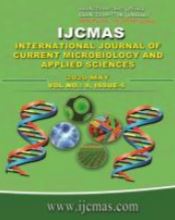


 National Academy of Agricultural Sciences (NAAS)
National Academy of Agricultural Sciences (NAAS)

|
PRINT ISSN : 2319-7692
Online ISSN : 2319-7706 Issues : 12 per year Publisher : Excellent Publishers Email : editorijcmas@gmail.com / submit@ijcmas.com Editor-in-chief: Dr.M.Prakash Index Copernicus ICV 2018: 95.39 NAAS RATING 2020: 5.38 |
Turcicum leaf blight (TLB) caused by Exserohilum turcicum is a major foliar disease affecting maize. The aims of this study were to: assess tebuconazole (folicure 250 EC) spray schedules on disease severity of TLB, determine optimum growth stage of the crop for tebuconazole spray and amount of spray solution of fungicide to be applied for cost effective TLB management. The effect of fungicide spray schedules on TLB management was assessed in a field experiment during kharif 2018 at MARS, Dharwad. In this experiment, ten treatments were imposed with fungicide tebuconazole 250 % EC @ 0.1 % foliar spray at different growth stages of the crop irrespective of disease occurrence besides a treatment with unsprayed control. Data were recorded on disease severity. Eight time severity scores were used to calculate area under disease progress curve (AUDPC). Grain yield and yield components were measured after harvest. Finally economics of the treatments were carried out. The results of present investigation revealed that the disease severity was significantly reduced by different spray schedules. However, combined spray at the onset of disease and spray before tasseling (T8) was found effective in controlling TLB, which recorded significantly lowest disease severity (28.52 per cent) with 57.47 per cent reduction over control and AUDPC value of 915.75.
 |
 |
 |
 |
 |